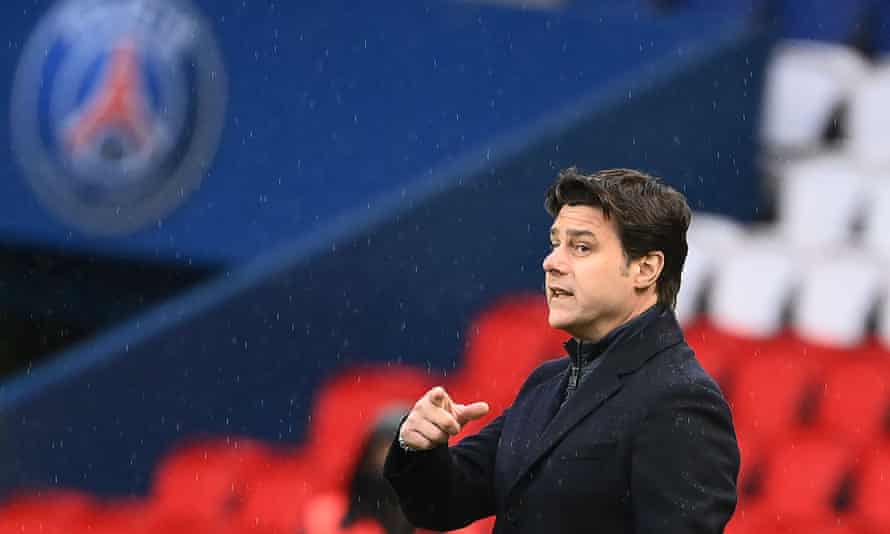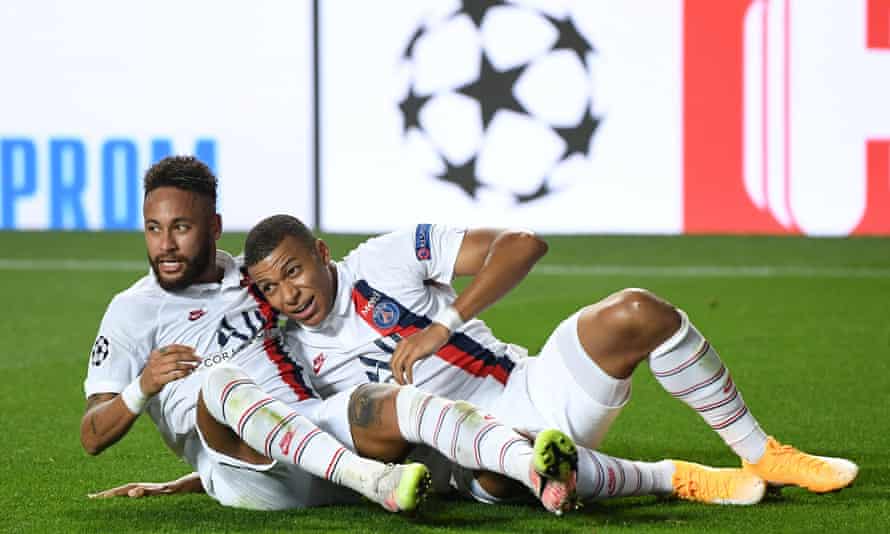The same procedure as last year? The same procedure as every year. But for how long? At some point, Paris Saint-Germain will win the Champions League and the world will be able to stop wondering if this could finally be their season. And so we go through the familiar rigmarole and ask, could this be it? Could the stars have aligned at last? Could PSG finally have found the right balance of coach and stellar players?
Certainly the 4-1 victory at Barcelona in the last 16, arguably their best performance in the Champions League, suggested they could. At which point the caveats immediately kick in. This is PSG, a club who have made a habit of freezing at key moments. This is PSG, who have won seven of the last eight French league titles and done four trebles in the past six years, who are unused to being challenged domestically and so tend to buckle under pressure in Europe (it may be that the battle at the top of Ligue 1 this season helps them). This is PSG, a byword for extravagance and excess.

The draw has really not been kind. If they get past Bayern Munich in the quarter-final – the away leg, with Robert Lewandowski absent with strained knee ligaments, is on Wednesday – they will face Manchester City in the semi-finals, assuming Pep Guardiola’s team get past Borussia Dortmund.
But the biggest issue, perhaps, is something more fundamental. PSG, more than any other club, represent the tension that lies at the heart of elite modern football. On the one hand, the game is more systematised and complex, more dependent upon the construction of a cohesive unit, than ever before. On the other, it has never been so hung up on celebrity and the importance of promoting the brand.
If there were any doubts about the priorities of modern directors – and there really shouldn’t have been – they must have been extinguished by the wrangling over Champions League reform. Gone with the Swiss system and the allocation of two places based on Uefa coefficient rather than actual qualification is any sense of sporting merit, of a football match as a contest between two teams for the prize of victory and progression, and in its place is content production: a turgid stream of revenue-generating games without much consequence.
That’s why there are still those at Juventus who insist the monstrous outlay on Cristiano Ronaldo was worth it. Given he was brought in to win Juve the Champions League, and they have won only one knockout tie with him in three seasons, his signing may have been a failure in football terms, but in terms of exposure for the brand, perhaps it has been worth it. It also perhaps explains Juventus’s decision to appoint as manager a stylish former player whose presence helps promote the club – Andrea Pirlo – rather than somebody who actually had any managerial experience.
For PSG, those issues boil down to Neymar. He was signed for a world-record fee as a conscious statement of intent. That he was the sun at the centre of PSG’s solar system was made clear by the way the club briefly changed their away kit to Brazilian yellow and the various privileges extended to him. It may be that for the generation of revenue that makes sense. But for the creation of a coherent team structure, it doesn’t.
Indulging a star may be enough to win domestic titles, but at the very highest level – at least for now – it is not enough, as the struggles of Juve with Ronaldo and, recently, Barcelona with Lionel Messi make clear. Mauricio Pochettino’s job is to reconcile celebrity and system, something that proved beyond Unai Emery and Thomas Tuchel even if a favourable draw did help them to reach last season’s Champions League final.
Notably, February’s victory at Barcelona came without Neymar. Pochettino could sit Idrissa Gueye and Leandro Paredes deep in midfield, with Marco Verratti (an injury doubt on Wednesday) snarling just in front of them, and with a front three of Moise Kean, Mauro Icardi and Kylian Mbappé, safe in the knowledge that they not only offered a potent threat on the break, but could be relied on to pin back the Barça full-backs.
Can he rely on Neymar in the same way? It’s not an issue of laziness or lack of application. It’s not that Neymar can’t be bothered to do the work, or that, like Messi, ageing legs prevent him from doing so. The old petulance still flickers occasionally – he was sent off for the second time this season against Lille on Saturday. But really, if anything, the problem is that he takes too personally the need to win, he takes too much of the burden on himself.

That is a faultline that has always existed in football: we’re quick to praise a player who transforms a game single-handed (see David Beckham against Greece in 2001) but judging when the moment is right to step out of the system into the spotlight is hugely difficult (see numerous subsequent Beckham games for England).
Although Neymar was widely considered to have played well in the final games of last season’s Champions League, and was excellent against RB Leipzig in the semi-final, there were times in the narrow quarter-final win over Atalanta when he dropped very deep, disrupting the team’s shape as he sought to initiate the comeback. By the end of the final, his frustration was clear.
Sign up to The Recap, our weekly email of editors’ picks
Bayern’s performance in that game demonstrated the overriding importance of shape. The thought beforehand was that their high line might be vulnerable to Mbappé’s extreme pace, but in the event the compact nature of their midfield meant that never became an issue. Whether Neymar could ever play in a side so disciplined is debatable.
Pochettino’s task is to find the appropriate balance. Bayern have not been so solid defensively this season and without Lewandowski, the model of a press-leading centre-forward, they are clearly diminished. This is an opportunity for PSG; how Pochettino is able to deploy Neymar, to reconcile those competing impulses of the modern game, will go a long way to determining whether they can take it.
from Football | The Guardian https://ift.tt/3wpllHC
via IFTTT

No Comment